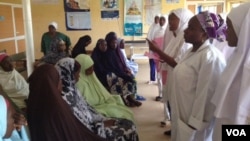KADUNA, NIGERIA —
For many women in Nigeria, a country with one of the highest maternal death rates in the world, the prospect of giving birth can be scary.
According to the U.N. children’s organization, UNICEF, more than 150 women die every day in pregnancy-related cases in Nigeria, an average of one death every 10 minutes.
It’s no wonder many pregnant women worry about coming out of the hospital or clinic alive.
“I asked my family members to embark on prayers for me,” says Eldina Istifanus, a mother of two. “I am sure that is why I am alive today.
“I almost died of childbirth complications during my first delivery,” she says. “I was afraid during my second delivery. I remembered my first experience and the experience of my friends who died in the process.”
Despite her fears, Istifanus counts herself lucky because she was in a private clinic.
“The situation is very bad in public hospitals,” she says. “The workers are not motivated and emergency services are almost absent. I don’t know what would have happened to me if I had gone there.”
Even though Nigeria’s maternal mortality statistics are among the world’s worst, doctors say the situation may be more dire than numbers indicate. Because the country has no standardized recordkeeping practices in rural communities and settlements — places where women rarely visit a hospital or clinic for pre-natal care or delivery — many pregnancy-related deaths, doctors say, are preventable.
What’s worse: While many of Nigeria’s public hospitals are ill-equipped and under-staffed, rural areas have few health facilities to speak of.
Possible national solutions
Some say the ability to save lives is simply a matter of government agencies making it a top priority.
According to Dr. Ado Muhammad, executive director of the National Primary Healthcare Development Agency (NPHCDA), Nigeria is working hard to address the problem.
Officials in Abuja, he says, have just hired an additional 6,000 midwives and health workers to curb the nation’s maternal death rate under the Midwives Service Scheme.
“Under the scheme, newly qualified, unemployed and retired midwives are engaged and sent to undertake one or two years [of] community service in selected rural communities,” he said, explaining that the new hires will join 4,000 others already serving rural areas.
“The lives of about 1.2 million expectant women — or nine million people — would be saved under the scheme by 2015,” he said.
The government is also working to pay pregnant women the equivalent of about $35 for at least four pre-natal health checkups, plus childcare support services.
“Our goal is to make pregnancy safer,” he said.
Two weeks ago President Goodluck Jonathan launched a program called ‘Saving One Million Lives’ to ensure sustainable and equitable access and use of 13 lifesaving commodities to women and children by 2015.
The program is part of U.N. Secretary-General’s Global Strategy to save 16 million lives by 2015 through increasing access to essential medicines that will address avoidable causes of death during pregnancy, childbirth and childhood.
Jonathan said his “administration has set aside $500 million for procurement of reproductive health commodities over the next four years.”
The 13 commodities include misoprostol for addressing post-partum haemorrhage and injectable antibiotics for newborn sepsis.
State government interventions
A number of Nigeria's state governments are opening primary health-care clinics and offering free medical services to pregnant women and children under the age of five.
In Kaduna state, Health Commissioner Turaki Khalid says the program has increased demand for health care.
“More than five million pregnant women and children below the age of five years have benefitted from the program introduced in 2007,” he said.
But Dorcas Adeyemi, an activist for maternal health care, says the state government needs to get new laws passed.
“Most of these state governments are running this program without the required laws to back them up,” Adeyemi said. “They should be more committed by enacting laws that support it.”
The Bill and Melinda Gates Foundation has a project called the Nigerian Urban Reproductive Health Initiative (NURHI) that is working with the Nigerian government to reduce maternal deaths.
Kabir Abdullahi, leader of the Gates project in Kaduna state, says even helping women space out their births through enlightenment and provision of family planning services can reduce maternal deaths by as much as 30 percent.
“We are encouraging state governments in Nigeria to create budget lines for family planning commodities and services to reduce the country’s high maternal and child deaths,” Abdullahi said.
Current efforts indicate that Nigeria is making progress in reducing its maternal mortality rates, but the pace is too slow for the country to attain the Millennium Development Goals of reducing maternal mortality by a third by 2015.










